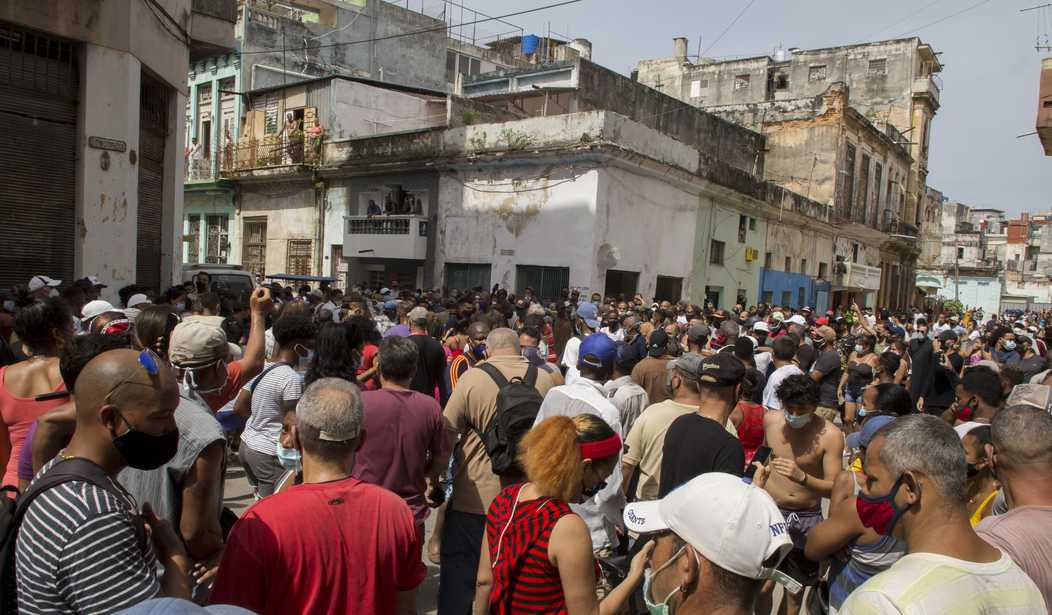Last week, the entire nation of Cuba was plunged into darkness when a massive failure in the Antonio Guiteras thermoelectric power plant in the city of Matanzas, the country's biggest power plant, caused a cascade failure of other power plants. Cubans experience outages of up to 20 hours a day because of dilapidated electric infrastructure and a lack of oil.
The power problems came on the heels of a water crisis as the equally old and poorly maintained water delivery system has been shut for weeks. More than 600,000 Cubans are without fresh water.
Ordinarily, the outages of power and water would have led to massive protests. But observers in Cuba report that beyond some pots and pans being banged by frustrated citizens, the streets are quiet.
Cubans are exhausted. More than a million Cubans have left the island, most of them arriving in the United States. Most of the protest leaders are gone, either emigrated or in prison. The government's intimidation campaign has largely been successful. And with most of the opposition leaders gone, there are few left to stand up to the authorities.
It's the power cuts that hurt the most. Even the rudimentary industry in Cuba comes to a screeching halt if the power goes out. Factories, offices, farms, bars, and discos can't operate more than a few hours a day due to the power situation.
Naturally, this has led to economic chaos and decline. "Inflation is at 30 percent, with the price of gasoline up 400 percent. Milk is a luxury product for the vast majority of Cubans. In just three years, the value of the Cuban peso on the street has plummeted from about 50 to 325 per U.S. dollar," writes Arturo McFields, a former OAS representative from Nicaragua, now exiled.
When the leader of the country calls protesters "drunk" and "indecent," few are going to challenge the status quo.
Cuban President Miguel Díaz-Canel took to the airwaves last week as some protesters took to the streets to make their feelings known about the state of the nation. He was dressed, ominously, in his military uniform. And his warning to the few people who took to the streets was plain.
"The only thing that contrasts with this determination of unity of our people, with these efforts to -together- overcome adversities, are some individuals, a minimal number of people, most of them in a state of intoxication, who have behaved in a… uh… indecent manner," said the ruler.
The entire country is stuck in the 1980s. After the Soviet Union collapsed and Russian aid disappeared (as well as Russian technicians who maintained infrastructure), Cuba has gone from one crisis to another. Even after the death of the Castros, the military junta that runs the island has refused to take steps to modernize the economy. Some small steps toward allowing a free market have collapsed because of corruption and a byzantine system that makes it nearly impossible to do business.
Castro’s dictatorship demolished agricultural and livestock production in Cuba. A country that once exported food today begs for it. For the first time in history, the Cuban dictatorship has asked for milk donations from the UN World Food Program, a confession of the regime’s scandalous failure. Cuba’s regime buys $2 billion in basic products, but corruption and mismanagement generate poverty and shortages of goods.
The Communist Party of Cuba is also promoting modern slavery. All or almost all of its doctors are being rented out abroad to raise money for the dictatorship. They are slaves, earning millions for the regime with their work overseas, for which they receive pennies on the dollar. As a consequence, Cuba is a country without doctors and without medicine. Finding a medical specialist in Cuba is like finding a needle in a haystack.
Cuba's water problem is not due to a lack of fresh water. The pipes are so old that even in wealthy neighborhoods, pipes are leaking more water than is being delivered to houses.
Rachel Trimiño, 32, said the root causes are no mystery, even in her Havana neighborhood of Vedado, a comparatively upscale district of the capital.
"All of the streets are full of leaking pipes, clean running water ... but nothing in our homes," she said.
The problem defies quick fixes.
Spare parts for outdated water infrastructure, like pipes and pumps, are in short supply, officials said. And without fuel and adequate transportation, even emergency water supply by cistern truck has been limited, according to residents.Frequent blackouts only make matters worse.
"When they cut off power, we can't give water," said San Miguel de Padron resident Pedro Martino, who works with a church group that offers residents small quantities to stem the shortfall. "One thing depends on the other, and that's the game we play."
It's a game that the residents of Cuba are losing.










